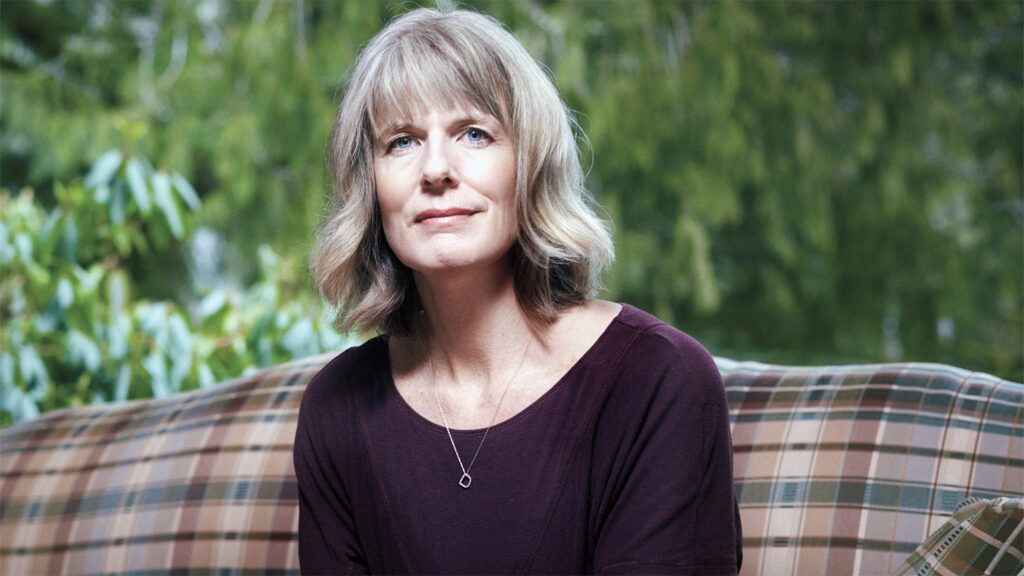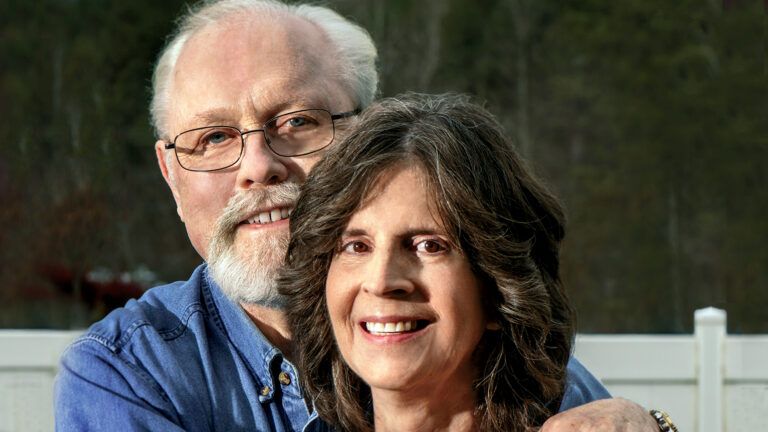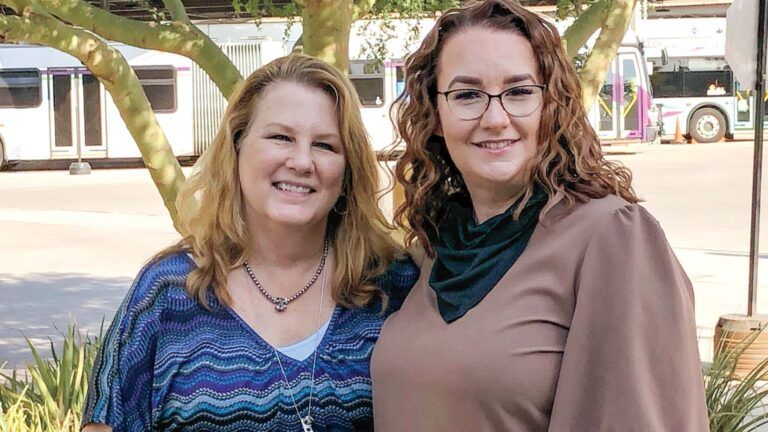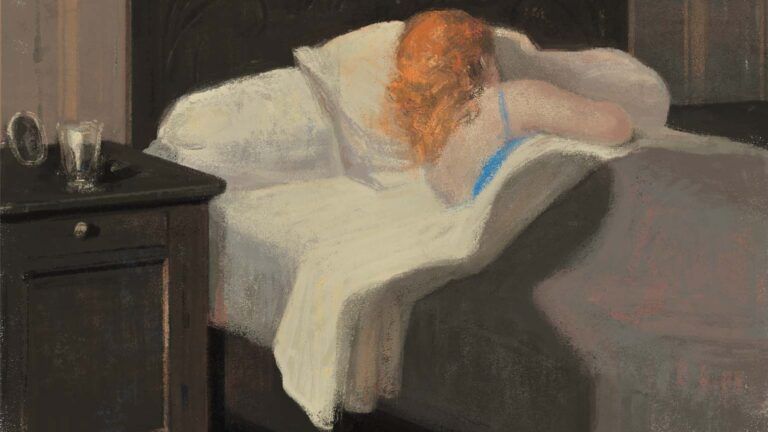I pulled into my sister’s driveway and sat in the car, gathering my courage. I hadn’t been inside since the day of Danelle’s funeral, two weeks earlier. Her husband, Dave, had invited me to come help him go through her things, especially clothes and personal items.
Was I ready for this? Danelle and I had been close. She was four years younger than me. As a child, she followed me around and wrote notes telling me how much she loved me and looked up to me.

issue of Guideposts
Grown up, we lived an hour and a half away from each other and bonded over marriage, kids, work, faith and the horses that we both loved to ride.
Danelle had beaten ovarian cancer five years earlier. We’d called it a miracle. We assumed God would be there for her again when she was diagnosed with mouth cancer in 2019.
There was no second miracle. The cancer was painful, disfiguring and unstoppable. We prayed, rallied our friends and our church, even flew Danelle to Europe for an alternative treatment. She died anyway, suffering right up to the end.
From the car, I could see the Japanese maple in the front yard. Danelle had loved that tree, and I loved it too—especially in the fall, when the leaves turned crimson. It was fall now, but the changing colors didn’t cheer me. Instead, they felt like a prelude to loss.
I glanced at my phone before getting out of the car. Danelle’s last text to me was still there: “Where are you?”
I had been with my sister when she died, and she had stopped using her phone by then. The text was from an earlier period when she must have been looking for me. Her words expressed what I felt now—toward God.
Where were you?
Dave met me at the door. “Thanks for coming,” he said, wrapping me in a six-foot-four-inch bear hug.
I could tell Dave needed support, but I didn’t have much to give. To be honest, I wished I could have postponed today’s visit. Seeing Danelle’s things, reliving the memories… I could barely get out of bed most days.
“I’m happy to help,” I said, forcing a smile. “I’ll clear Danelle’s closets plus her dresser and her jewelry.”
“That would be great,” Dave said, obviously relieved. “I didn’t know what to do with all of those things. I have some of her books for you too. And her journals.”

Like me, Danelle was a journaler. Ordinarily, I would have felt privileged to read her reflections about life. My sister was a restless thinker and a deeply faithful believer. She hated churchy platitudes and shallow prayers. Whatever she wrote was sure to be unsparing and revealing.
I couldn’t tell Dave, but those journals were the last things I felt ready to take right now. They were repositories of Danelle herself. I knew they would be full of painful details about her illness. Maybe even a confession of feeling abandoned by God, though she had never said such a thing out loud. Just seeing those journals would remind me of her spiritual suffering.
“I’ll leave you to it,” said Dave, seeming eager to get back to whatever he had been doing. I gathered my resolve and headed for the bedroom.
Danelle was the fashionista of the two of us. She lived in a suburb of Seattle, while I lived in the woods and, with my husband, Mark, ran a trucking business.
“You should wear more color, Cath,” my sister had often chided me, advice I’d never managed to take. I sorted her clothing into piles—keep, give to family or friends, donate—smiling a little at all of Danelle’s fancy outfits and accessories.
I paused over the classy suits that she had bought in preparation for opening her own accounting business. Danelle had gone back to school once her kids were older and, even during chemotherapy, had managed to pass her CPA exams.
I threw the suits in a box.
A pair of colorful cowboy hats reminded me of the last trip that she and I had taken together, a horseback riding tour of Yellowstone National Park. Danelle had bought a blue hat for me, pink for her. For one blissful week, we rode every day and camped at night under a canopy of stars.
Remembering that trip brought me up short. That was when I’d first learned about the return of Danelle’s cancer. We were talking outside our tent one evening when Danelle mentioned a sore inside her mouth that wouldn’t heal.
A few weeks later, doctors removed a part of her tongue.
The cancer spread fast. There were more operations to remove lymph nodes and a salivary gland. Chemotherapy. Powerful pain medications that drew a haze over her mind.
Then Covid hit. All of a sudden, my sister, my best friend, my confidante in faith and life, was on the other side of an impassable divide.
I had never prayed so hard. Family members, friends, coworkers, our church—everyone showered Danelle with love and support. I kept waiting for God to show up with a miracle healing. I was still waiting when Danelle took her last breath.
I filled the back of my SUV with boxes and clothes. On top, I gently laid Danelle’s long black wool coat, which she wore to concerts when she sang with a local choral society. She’d affixed a pin on the lapel engraved with the word Faith.
I gritted my teeth. I knew faith was “evidence of things unseen.” But all those fervent prayers had amounted to nothing on the day that Danelle had died in a hospice facility. I’d told her I loved her and felt her squeeze my hand. She’d stopped breathing a few minutes later.
“Don’t forget these,” Dave said, setting a box of books and a few journals on the back seat.
“Thanks,” I said. “I’ll hang on to them.”
Back home, I put the clothes and boxes of Danelle’s books in a spare room. I eyed the journals, afraid to read them. But it felt wrong to leave them here. I put them on my bedroom dresser, beside my own journal.
For weeks, I went through the motions, feeling numb. My dad was a pastor, and I have always had a strong faith. Danelle’s death didn’t make me doubt God was real; it did make me wonder whether I had misunderstood God.
I felt like Jesus’ disciples after he tells them he’s going to be crucified. By that point, most of his followers have abandoned him, realizing he wouldn’t be the conquering Messiah they’d expected.
“Are you leaving too?” Jesus asks the disciples.
“Where would we go?” they reply.
That was my question.
Early one morning, I reached for my journal on my dresser. I often write reflections during the predawn quiet. For some reason, my hand picked up one of Danelle’s journals instead, the one in which she had chronicled the last years of her life.
On the cover was an image of a tree and a line from Scripture: “I will walk by faith, even when I cannot see.”
I held the journal, turning those words over in my mind. I knew I should put the journal down and carry on with my quiet time. But I couldn’t.
I sat in my favorite chair and slowly pulled back the cover of the journal. “Okay, God,” I said. “I’ve tried to walk by faith, but now I need to see.”
I flipped to a page in the middle and braced for a pull-no-punches description of painful treatment or feelings of despair. Danelle never minced words.
“You are my everything, Lord,” Danelle wrote. “This year has made me know that you always show up for me.”
I looked at the date: September 2017. Exactly two years before her diagnosis, four years before she died. Well, she wasn’t sick then, so that didn’t count.
I flipped forward to the following year, landing on January 1: “I am so grateful I got to see this day dawn. A new beginning, like you promised. I look forward to what you hold in your hand for me because I trust you.”
I flipped further ahead to the day of her diagnosis. “It was a great and terrible day,” she wrote. Great? What was great about it? The rest of the entry was an honest accounting of her fears plus her determination to trust God through everything.
I turned to the next page. And the next. Eventually, the pain meds took hold, the entries petering out. Nowhere could I find a single line of anger or disappointment in God. Everything was gratitude and love.
I realized I was near the end of the book. The parts about her cancer were actually comparatively short.
I flipped back and read page after page of Danelle’s delight in life. There were her kids maturing and becoming independent adults. Her repeated attempts to pass the CPA exam and her final triumph. Fun vacations. Observations about life and people.
On nearly every page, there were declarations of her deep faith in God. Gratitude for his daily provision. Searching questions about a bit of Scripture or a theological issue raised by something Danelle had read.
Regret? Anger? Bitterness? None to be found.
This was a journal about life, not death. It was the record of a vibrant woman whose love for God was unconditional and kept her from getting stuck in negativity. Faith powered everything she did. She was at peace because she trusted her redeemer right up to the end.
Danelle was my younger sister, but here she was showing me the right way to live.
I’ll never stop missing Danelle. But I am no longer confused about who God is. After Danelle died, I couldn’t stop thinking about all the ways God didn’t show up. I was so focused on where God wasn’t that I lost sight of where he was.
Danelle knew. She wrote about it every day in her journal. She lived it during every one of her 45 never-a-dull-moment years of life.
Her spirit was still strong on that last day, when she squeezed my hand to say a final “I love you.” By that point, Danelle was ready to say goodbye.
On her grave, she asked for an inscription from Paul’s first letter to the Corinthians: “Now we, with unveiled faces, are being transformed.”
She never lost sight of God’s transformative power. Reading her words, at last I saw it too.
For more inspiring stories, subscribe to Guideposts magazine.





